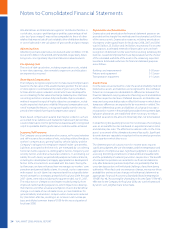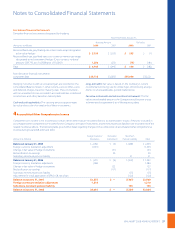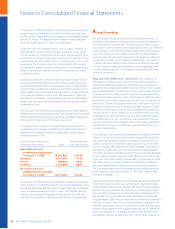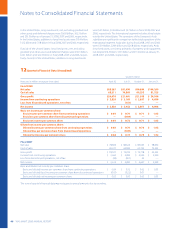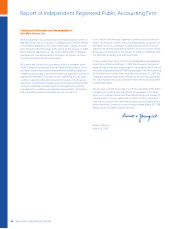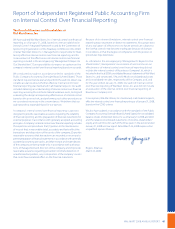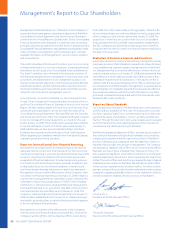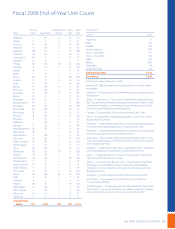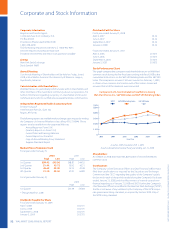Walmart 2008 Annual Report Download - page 45
Download and view the complete annual report
Please find page 45 of the 2008 Walmart annual report below. You can navigate through the pages in the report by either clicking on the pages listed below, or by using the keyword search tool below to find specific information within the annual report.
Notes to Consolidated Financial Statements
WAL-MART 2008 ANNUAL REPORT 43
has substantial factual and legal defenses to the claims at issue, and
on December 7, 2007, the Company led its Notice of Appeal.
In another of the class-action lawsuits described above, Braun v.
Wal-Mart Stores, Inc., a trial commenced on September 24, 2007, in
the First Judicial District Court for Dakota County, Minnesota, on the
plaintis’ claims for backpay damages. The plaintis allege that class
members worked o the clock and were not provided meal and
rest breaks in accordance with Minnesota law, and seek monetary
damages in an unspecied amount, together with attorneys’ fees,
interest, statutory penalties, and punitive damages, if any. Testimony
concluded on December 11, 2007, on the plaintis’ backpay claims,
and the judge took the matter under advisement. No ruling has been
received. The judge has not determined whether the plaintis will be
allowed to proceed to trial on their claims for punitive damages, but a
separate trial has been scheduled for October 20, 2008, in the event
those claims are allowed to proceed to trial. The Company believes
that it has substantial factual and legal defenses to the claims at issue.
The Company cannot reasonably estimate the possible loss or range
of loss that may arise from this litigation.
Exempt Status Cases: The Company is currently a defendant in two
putative class actions pending in federal court in California in which
the plaintis seek certication of a class of salaried managers who
challenge their exempt status under state and federal laws. In one
of those cases (Sepulveda v. Wal-Mart Stores, Inc.), class certication
has been denied and the ruling is now on appeal. In the other
(Salvador v. Wal-Mart Stores, Inc. and Sam’s West, Inc.), certication
has not yet been addressed by the trial court. The Company cannot
reasonably estimate the possible loss or range of loss that may arise
from these lawsuits.
Gender Discrimination Cases: The Company is a defendant in Dukes
v. Wal-Mart Stores, Inc., a class-action lawsuit commenced in June 2001
and pending in the United States District Court for the Northern
District of California. The case was brought on behalf of all past and
present female employees in all of the Company’s retail stores and
warehouse clubs in the United States. The complaint alleges that the
Company has engaged in a pattern and practice of discriminating
against women in promotions, pay, training and job assignments.
The complaint seeks, among other things, injunctive relief, front pay,
back pay, punitive damages, and attorneys’ fees. On June 21, 2004,
the district court issued an order granting in part and denying in part
the plaintis’ motion for class certication. The class, which was
certied by the district court for purposes of liability, injunctive and
declaratory relief, punitive damages, and lost pay, subject to certain
exceptions, includes all women employed at any Wal-Mart domestic
retail store at any time since December 26, 1998, who have been or
may be subjected to the pay and management track promotions
policies and practices challenged by the plaintis. The class as certi-
ed currently includes approximately 1.6 million present and former
female associates.
The Company believes that the district court’s ruling is incorrect. On
August 31, 2004, the United States Court of Appeals for the Ninth Cir-
cuit granted the Company’s petition for discretionary review of the
ruling. On February 6, 2007, a divided three-judge panel of the Court
of Appeals issued a decision arming the district court’s certication
order. On February 20, 2007, the Company led a petition asking that
the decision be reconsidered by a larger panel of the court. On
December 11, 2007, the three-judge panel withdrew its opinion of
February 6, 2007, and issued a revised opinion. As a result, Wal-Mart’s
Petition for Rehearing En Banc was denied as moot. Wal-Mart led
a new Petition for Rehearing En Banc on January 8, 2008. If the Com-
pany is not successful in its appeal of class certication, or an appel-
late court issues a ruling that allows for the certication of a class or
classes with a dierent size or scope, and if there is a subsequent
adverse verdict on the merits from which there is no successful
appeal, or in the event of a negotiated settlement of the litigation, the
resulting liability could be material to the Company. The plaintis
also seek punitive damages which, if awarded, could result in the
payment of additional amounts material to the Company. However,
because of the uncertainty of the outcome of the appeal from the
district court’s certication decision, because of the uncertainty of
the balance of the proceedings contemplated by the district court,
and because the Company’s liability, if any, arising from the litigation,
including the size of any damages award if plaintis are successful
in the litigation or any negotiated settlement, could vary widely, the
Company cannot reasonably estimate the possible loss or range of
loss that may arise from the litigation.
The Company is a defendant in a lawsuit that was led on August 24,
2001, in the United States District Court for the Eastern District of
Kentucky. EEOC (Janice Smith) v. Wal-Mart Stores, Inc. is an action
brought by the EEOC on behalf of Janice Smith and all other females
who made application or transfer requests at the London, Kentucky,
distribution center from 1995 to the present, and who were not hired
or transferred into the warehouse positions for which they applied.
The class seeks back pay for those females not selected for hire or
transfer during the relevant time period. The class also seeks injunc-
tive and prospective armative relief. The complaint alleges that the
Company based hiring decisions on gender in violation of Title VII of
the 1964 Civil Rights Act as amended. The EEOC can maintain this
action as a class without certication. The Company cannot reason-
ably estimate the possible loss or range of loss that may arise from
this litigation.
California Hazardous Materials Investigations: On November 8,
2005, the Company received a grand jury subpoena from the United
States Attorney’s Oce for the Central District of California, seeking
documents and information relating to the Company’s receipt, trans-
portation, handling, identication, recycling, treatment, storage and
disposal of certain merchandise that constitutes hazardous materials
or hazardous waste. The Company has been informed by the U.S.
Attorney’s Oce for the Central District of California that it is a target
of a criminal investigation into potential violations of the Resource
Conservation and Recovery Act (“RCRA”), the Clean Water Act, and
the Hazardous Materials Transportation Statute. This U.S. Attorney’s
Oce contends, among other things, that the use of Company trucks
to transport certain returned merchandise from the Company’s stores
to its return centers is prohibited by RCRA because those materials
may be considered hazardous waste. The government alleges that,
to comply with RCRA, the Company must ship from the store certain
materials as “hazardous waste” directly to a certied disposal facility
using a certied hazardous waste carrier. The Company contends
that the practice of transporting returned merchandise to its return
centers for subsequent disposition, including disposal by certied
facilities, is compliant with applicable laws and regulations. While
management cannot predict the ultimate outcome of this matter,
management does not believe the outcome will have a material
eect on the Company’s nancial condition or results of operations.



